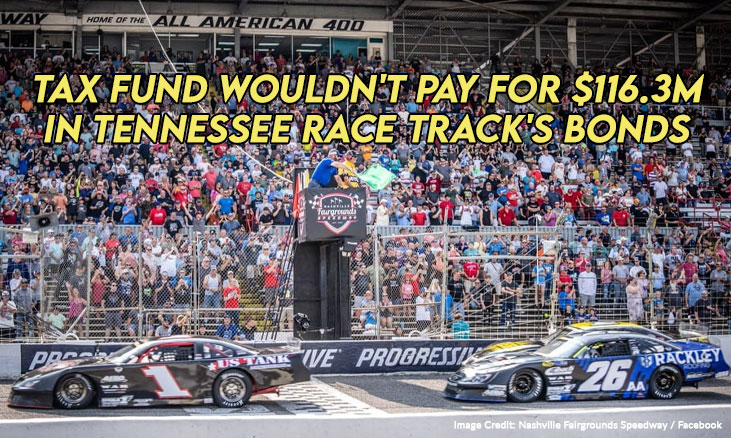Image Credit: Nashville Fairgrounds Speedway / Facebook
The Center Square [By Jon Styf] –
Metro Nashville’s Mayor’s Office announced a deal to renovate or rebuild Nashville Fairgrounds Speedway to the city’s Fair Board last Tuesday without a final price tag.
But an analysis done by Conventions, Sports & Leisure International in May showed that the planned funding for a $116.3 million project would fall short of its payments. The deal was previously termed a $75 million project but construction costs later increased to make it more than $100 million.

Fair Board members and later the city’s Sports Authority and Metro Council will be asked to approve term sheets of the deal. The Sports Authority would be the entity applying for revenue bonds for the project.
“As depicted, total projected revenues in the first two years of operations are anticipated to be $714,484 to $1.3 million less than project costs,” the CSL report said. “Over the 30-year financing period, the aggregate shortfall in meeting project cost is estimated to be $6.5 million.”
The shortfall was due in part to attendance overestimates, according to CSL, based upon similar venues.
The proposed deal also includes a “first class” stipulation for the speedway similar to one Metro Nashville is currently dealing with in its lease agreement with the Tennessee Titans at Nissan Stadium. The difference is that Bristol, which would operate the speedway, owns many of the comparable NASCAR race tracks including Bristol, Charlotte, Atlanta and Las Vegas.
After the report, the deal has changed. When it was introduced last week, a one-time payment toward the project from the Nashville Convention and Visitors Corporation jumped from $2 million to $17 million. The first $4 million from the CVC will go toward $6 million in design work for the project to determine a maximum cost.
The 30-year lease with operator Bristol Motor Speedway and the renovation deal leans on a $17 million payment from the state of Tennessee, $17 million from the Nashville Convention and Visitors Corporation and a tax fund that will include sales tax from events and any merchandise or food and drink sales at the speedway.
The bond fund will also receive the first $600,000 of sponsorships at the speedway, 10% of any naming rights deal, 15% of food and beverage sales and 5% of gross revenues from events that aren’t part of Bristol’s main four race weekends, along with ticket taxes.
The track will remain limited to a 10-weekend racing schedule each year.
The CVC, which plans to host events at the speedway, receives most of its funding from a diverted Metro Nashville hotel tax, which sends one-third of its collected hotel taxes to the nonprofit to promote the city.
The CVC was funded with between $32 million in fiscal 2017, $38 million in 2018 and a COVID-impacted $27 million in 2019. The city currently has five more years on a deal with the CVC for its tourism promotion.
“Following the expiration of this contract, Metro could elect to appropriate hotel occupancy tax revenues to an entity engaged in tourism promotion other than the CVC,” the report said. “In that event, the CVC’s ability to make its scheduled payments to BMS would be adversely affected. Metro would bear the risk of any shortfall in project revenues resulting from the CVC’s inability to make its contractual payments to BMS.”
The CVC has also agreed to pay $650,000 annually to Bristol to use the track up to 20 days each year for events.
The renovation deal calls for a completely redone grandstand and track, with the grandstand needing to hold at least 30,000 fans to meet the threshold for a state and local sales tax deal where all of the collected taxes go toward construction and bonds to go into effect.

The sales tax deal is expected to bring in nearly $2 million annually when the track would host Cup races and $1.5 million in non-Cup years, per CSL, which is $600,000 less than Bristol has estimated.
When the bill passed the Tennessee Legislature in 2021, it had an estimated impact of $65,400 in tax revenue per year before the renovation with that number growing to an estimated $734,000 per year if a NASCAR Cup series race comes to the fairgrounds.
The deal CSL analyzed also proposed having Bristol send $163,000 annually to the Fair Board to make up for the lost annual net operating income from Bristol operating the speedway. The newly proposed deal includes a $103,125 annual payment to the Fair Board with a 2% escalator.


About the Author: Jon Styf, The Center Square Staff Reporter – Jon Styf is an award-winning editor and reporter who has worked in Illinois, Texas, Wisconsin, Florida and Michigan in local newsrooms over the past 20 years, working for Shaw Media, Hearst and several other companies. Follow Jon on Twitter @JonStyf.


